同位语从句专项训练ss
(完整版)同位语从句专项训练(可编辑修改word版)
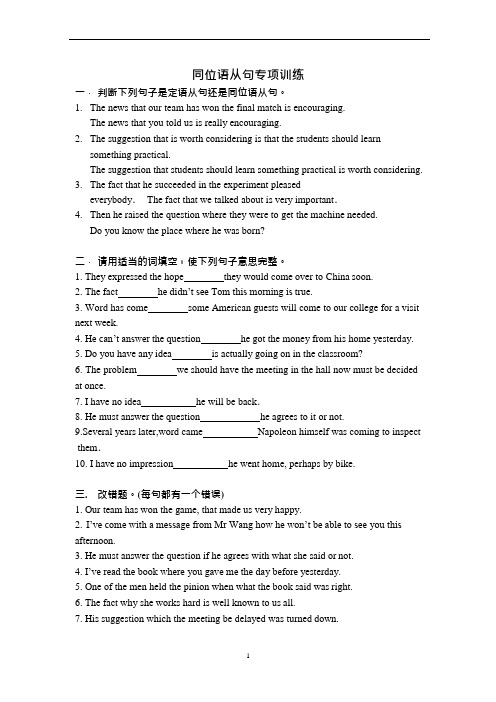
同位语从句专项训练一.判断下列句子是定语从句还是同位语从句。
1.The news that our team has won the final match is encouraging.The news that you told us is really encouraging.2.The suggestion that is worth considering is that the students should learnsomething practical.The suggestion that students should learn something practical is worth considering.3.The fact that he succeeded in the experiment pleasedeverybody.The fact that we talked about is very important.4.Then he raised the question where they were to get the machine needed.Do you know the place where he was born?二.请用适当的词填空,使下列句子意思完整。
1.They expressed the hope they would come over to China soon.2.The fact he didn’t see Tom this morning is true.3.Word has come some American guests will come to our college for a visit next week.4.He can’t answer the question he got the money from his home yesterday.5.Do you have any idea is actually going on in the classroom?6.The problem we should have the meeting in the hall now must be decided at once.7.I have no idea he will be back.8.He must answer the question he agrees to it or not.9.Several years later,word came Napoleon himself was coming to inspect them.10.I have no impression he went home, perhaps by bike.三. 改错题。
同位语从句专项讲解及练习含答案
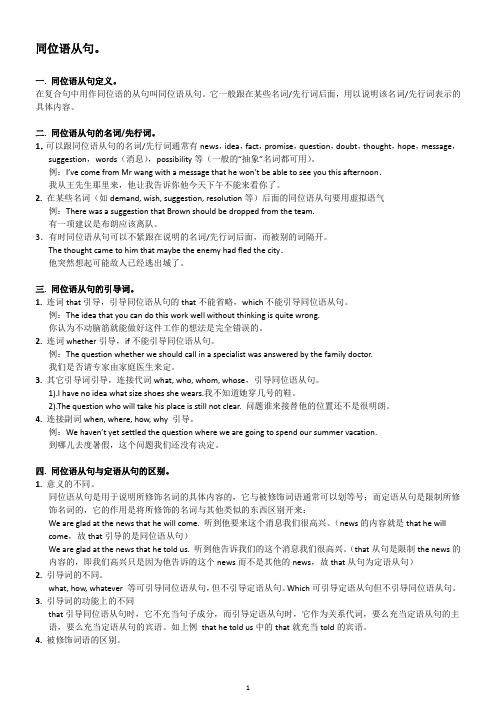
同位语从句。
一. 同位语从句定义。
在复合句中用作同位语的从句叫同位语从句。
它一般跟在某些名词/先行词后面,用以说明该名词/先行词表示的具体内容。
二. 同位语从句的名词/先行词。
1.可以跟同位语从句的名词/先行词通常有news,idea,fact,promise,question,doubt,thought,hope,message,suggestion,words(消息),possibility等(一般的“抽象”名词都可用)。
例:I’ve come from Mr wang with a message that he won’t be able to see you this afternoon.我从王先生那里来,他让我告诉你他今天下午不能来看你了。
2. 在某些名词(如demand,wish,suggestion,resolution等)后面的同位语从句要用虚拟语气例:There was a suggestion that Brown should be dropped from the team.有一项建议是布朗应该离队。
3.有时同位语从句可以不紧跟在说明的名词/先行词后面,而被别的词隔开。
The thought came to him that maybe the enemy had fled the city.他突然想起可能敌人已经逃出城了。
三. 同位语从句的引导词。
1.连词that引导,引导同位语从句的that不能省略,which不能引导同位语从句。
例:The idea that you can do this work well without thinking is quite wrong.你认为不动脑筋就能做好这件工作的想法是完全错误的。
2. 连词whether引导,if不能引导同位语从句。
例:The question whether we should call in a specialist was answered by the family doctor.我们是否请专家由家庭医生来定。
高中英语同位语从句练习题20题含答案解析

高中英语同位语从句练习题20题含答案解析1. The news ______ we are having a holiday tomorrow is not true.A. whichB. thatC. whetherD. if答案解析:B。
同位语从句是对前面名词的内容进行解释说明。
在这个句子中,“the news”是抽象名词,“we are having a holiday tomorrow”是对“the news”内容的解释,这种从句叫同位语从句。
同位语从句通常用that引导,that在从句中不充当任何成分。
选项A“which”在从句中要充当成分,这里不合适。
选项C“whether”和选项D“if”表示“是否”,不符合句子语境。
2. There is some doubt ______ he will come on time.A. thatB. whetherC. ifD. which答案解析:B。
“doubt”(怀疑)作名词时,在肯定句中,其后的同位语从句用“whether”引导,表示“是否”。
“that”引导同位语从句时,从句是对前面名词内容的确切解释,这里不是这种情况。
“if”不能引导同位语从句。
“which”在从句中要充当成分,不符合要求。
3. The fact ______ he didn't see Tom yesterday is true.A. whichB. thatC. whenD. what答案解析:B。
“the fact”是抽象名词,“he didn't see Tom yesterday”是对“the fact”内容的解释,是同位语从句,用“that”引导。
“which”在从句中要充当成分,这里不合适。
“when”引导时间状语从句等,“what”不能引导同位语从句。
4. I have no idea ______ he will go abroad for further study.A. ifB. thatC. whetherD. which答案解析:C。
同位语从句及练习题(含答案)
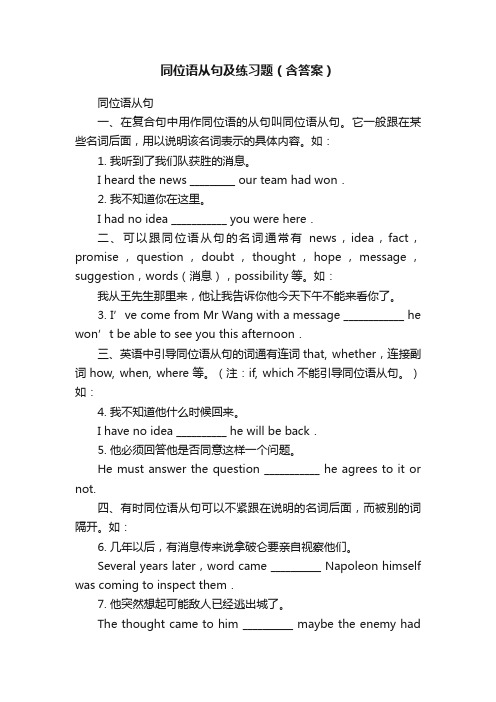
同位语从句及练习题(含答案)同位语从句一、在复合句中用作同位语的从句叫同位语从句。
它一般跟在某些名词后面,用以说明该名词表示的具体内容。
如:1. 我听到了我们队获胜的消息。
I heard the news _________ our team had won.2. 我不知道你在这里。
I had no idea ___________ you were here.二、可以跟同位语从句的名词通常有news,idea,fact,promise,question,doubt,thought,hope,message,suggestion,words(消息),possibility等。
如:我从王先生那里来,他让我告诉你他今天下午不能来看你了。
3. I’ve come from Mr Wang with a message ____________ he won’t be able to see you this afternoon.三、英语中引导同位语从句的词通有连词that, whether,连接副词how, when, where等。
(注:if, which不能引导同位语从句。
)如:4. 我不知道他什么时候回来。
I have no idea __________ he will be back.5. 他必须回答他是否同意这样一个问题。
He must answer the question ___________ he agrees to it or not.四、有时同位语从句可以不紧跟在说明的名词后面,而被别的词隔开。
如:6. 几年以后,有消息传来说拿破仑要亲自视察他们。
Several years later,word came __________ Napoleon himself was coming to inspect them.7. 他突然想起可能敌人已经逃出城了。
The thought came to him __________ maybe the enemy hadfled the city.五、同位语从句与定语从句的区别。
中考英语同位语从句练习题30题
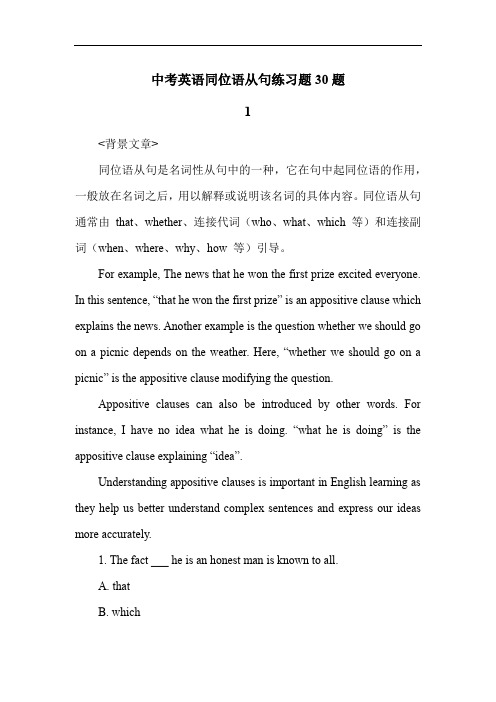
中考英语同位语从句练习题30题1<背景文章>同位语从句是名词性从句中的一种,它在句中起同位语的作用,一般放在名词之后,用以解释或说明该名词的具体内容。
同位语从句通常由that、whether、连接代词(who、what、which 等)和连接副词 when、where、why、how 等)引导。
For example, The news that he won the first prize excited everyone. In this sentence, “that he won the first prize” is an appositive clause which explains the news. Another example is the question whether we should go on a picnic depends on the weather. Here, “whether we should go on a picnic” is the appositive clause modifying the question.Appositive clauses can also be introduced by other words. For instance, I have no idea what he is doing. “what he is doing” is the appositive clause explaining “idea”.Understanding appositive clauses is important in English learning as they help us better understand complex sentences and express our ideas more accurately.1. The fact ___ he is an honest man is known to all.A. thatB. whichD. who答案:A。
八年级英语同位语从句专项练习单选题30题
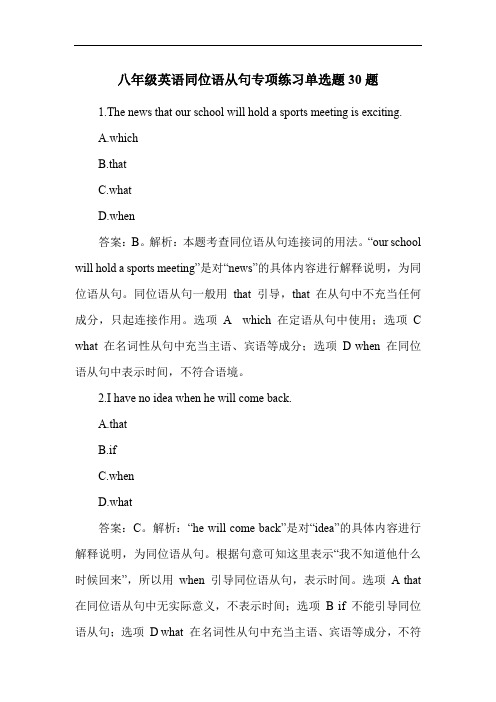
八年级英语同位语从句专项练习单选题30题1.The news that our school will hold a sports meeting is exciting.A.whichB.thatC.whatD.when答案:B。
解析:本题考查同位语从句连接词的用法。
“our school will hold a sports meeting”是对“news”的具体内容进行解释说明,为同位语从句。
同位语从句一般用that 引导,that 在从句中不充当任何成分,只起连接作用。
选项 A which 在定语从句中使用;选项 C what 在名词性从句中充当主语、宾语等成分;选项D when 在同位语从句中表示时间,不符合语境。
2.I have no idea when he will come back.A.thatB.ifC.whenD.what答案:C。
解析:“he will come back”是对“idea”的具体内容进行解释说明,为同位语从句。
根据句意可知这里表示“我不知道他什么时候回来”,所以用when 引导同位语从句,表示时间。
选项 A that 在同位语从句中无实际意义,不表示时间;选项B if 不能引导同位语从句;选项D what 在名词性从句中充当主语、宾语等成分,不符合语境。
3.The fact that he is always late makes his teacher angry.A.whichB.thatC.whatD.why答案:B。
解析:“he is always late”是对“fact”的具体内容进行解释说明,为同位语从句。
同位语从句一般用that 引导,that 在从句中不充当任何成分,只起连接作用。
选项 A which 在定语从句中使用;选项C what 在名词性从句中充当主语、宾语等成分;选项D why 在同位语从句中表示原因,不符合语境。
4.We heard the news that our team had won the game.A.whichB.thatC.whatD.when答案:B。
高中英语同位语从句形式练习题50题
高中英语同位语从句形式练习题50题1.The news that the famous writer won the Nobel Prize excited all his fans.A.whichB.whatC.thatD.who答案解析:C。
本题中“the news”是先行词,后面的“that the famous writer won the Nobel Prize”是同位语从句,对“the news”进行解释说明。
选项A“which”一般引导定语从句;选项B“what”不能引导同位语从句;选项D“who”一般用于引导定语从句修饰人。
同位语从句通常用that 引导,且that 在从句中不充当成分。
2.The report that a new planet has been discovered amazed scientists.A.whichB.whatC.thatD.who答案解析:C。
“the report”是先行词,“that a new planet has been discovered”是同位语从句解释“the report”。
选项A“which”一般引导定语从句;选项B“what”不能引导同位语从句;选项D“who”用于引导定语从句修饰人。
同位语从句一般由that 引导,that 在从句中不充当成分。
3.The rumor that the movie star is getting married spread quickly.A.whichB.whatC.thatD.who答案解析:C。
“the rumor”是先行词,“that the movie star is getting married”是同位语从句解释“the rumor”。
选项A“which”引导定语从句;选项B“what”不能引导同位语从句;选项D“who”引导定语从句修饰人。
同位语从句通常用that 引导,that 在从句中不充当成分。
高中同位语从句的专项习题 有答案
2.6同位语从句的专项习题一、同位语从句的定义同位语从句是用以解释、说明某一名词内容的从句,它总是跟在改词的后面。
二、同位语从句修饰的名词idvice belief doubt explanation fact fear feeling hopeidea news opinion order possibility promise problenprobability question reply report suggstion thoughttruth wish warning三、连接词引导同位语从句的词主要有that,whether,who,why, when,where, how等。
(注:if,which 不能引导同位语从句。
)①同位语从句是意义完整的陈述句时,用连词that引导。
注:that在从句中不充当任何成分,只起连接作用,通常不省略。
I got the news that he would come to see me the next week.②同位语从句是疑问句时,应根据语境选用who, when ,where, how, whether(不能用if)等词来引导。
The question who is the best for the job requires consideration.③分隔式同位语从句:当主句的谓语较短,而同位语从句较长时,为了使句子保持平衡,常把同位语从句后置。
An idea came to him that he could buy her a diamond ring.④当advice, order, suggestion等词表示建议、命令的词后的同位语从句中的谓语动词须用(should) +动词原形He made the suggestion that the meeting(should) be put off.专项练习1.The fact ________ she works hard is well known to us all.A.thatB.whatC.whyD.which2.The fact ________ he was successful proves his ability.A.thatB.whatC.whichD.why3.The news ________ he was kidnapped surprised us greatly.A.whatB.thatC.whyD.when4.His suggestion ________ the meeting be delayed was turned down.A.whichB.thatC./D. it5.I have no idea ________ he will start.A.whenB.thatC.whatD./6.I've come from the government with a message ________ the meeting won't be held tomorrow.A.ifB.thatC.whetherD.which7.The thought ________ he might fail in the exam worried him.A.whenB.whichC.whatD.that8.The order ________ the prisoner be set free arrived too late.A.whichB.whetherC.thatD.what9.The nurses are trying their best to reduce the patient's fear ________ he would die of the disease.A.thatB.asC.of whichD.which10.He often asked me the question ________ the work was worth doing.A.whetherB.whereC.thatD.when11.The reason ________the little actress has been such a success is ________she is both clever and hard-working.A.why, whyB.why, thatC.that, becauseD.for, because12.________troubles me is ________I can’t learn all t hese English idioms by heart.A. That, thatB. What, whatC. That, whatD. What, that1-5 AABBA 6-10 BDCAA 11-12 BA。
同位语从句及练习题(含答案)
同位语从句及练习题(含答案)同位语从句一、同位语从句是复合句中的一种,用来说明某些名词的具体内容。
通常跟在名词后面。
例如:1.我听到了我们队获胜的消息。
I heard the news that our team had won.2.我不知道你在这里。
I had no idea that you were here.二、常用作同位语从句的名词有news,idea,fact,promise,n,doubt,thought,hope,message,n,words(消息),possibility等。
例如:我从XXX那里来,他让我告诉你他今天下午不能来看你了。
I’ve come from Mr。
Wang with a message that he won’t be able to see you this afternoon.三、引导同位语从句的词有连词that。
whether,连接副词how。
when。
where等。
但if。
which不能引导同位语从句。
例如:4.我不知道他什么时候回来。
I have no idea when he will be back.5.他必须回答他是否同意这样一个问题。
XXX whether he agrees to it or not.四、同位语从句有时可以被别的词隔开,不紧跟在说明的名词后面。
例如:6.几年以后,有消息传来说XXX要亲自视察他们。
Several years later。
word XXX.7.他突然想起可能敌人已经逃出城了。
XXX to him that maybe the enemy had fled the city.五、同位语从句与定语从句的区别在于同位语从句与前面的名词是同位关系,即说明它前面名词的内容;而定语从句与前面的名词是修饰与被修饰关系,即限定它前面的名词范围,或补充一些情况。
例如:The news that they had won the game soon spread over the whole school.The general gave the order that the soldiers should cross the river at once.We'll discuss the problem of whether the sports meeting will be held on time.I have no n of how he went home。
高中英语重点句型——同位语从句专项练习(知识点+习题解析)
英语句型同位语从句专项练习(知识点+习题解析)定义:同位语表示与之同位的名词(短语)的实际内容,对前面的名词(短语)加以补充说明或进一步解释。
Definition:An appositive clause explains a noun, or shows the meaning ofa noun.例句:1.The suggestion that we should develop the natural resources in the region has been discussed.关于我们应该开发本地区资源的建议已经讨论过了。
2.The idea that we asked Mike to come yesterday is quite good.昨天我们请迈克来,这个主意太好了。
3.The fact that the earth moves around the sun is known to all.地球围绕太阳转,这个事实人人皆知。
4.We have a doubt whether it is true.我们怀疑那是不是真的。
5.The text tells us a fact that smoking does great harm to people's health .这篇课文又告诉我们一个事实,吸烟对健康危害很大。
6.The idea that he we could ask the teacher for advice is wonderful.我们可以向老师请教,这个主意不错。
同位语从句的连接词1.引导同位语从句的连接词最常见的是that。
2. 连接词when, where, why, whether, how 等也可引导同位语从句。
例如:Have you any idea how fast sound travels? 你知道声音传播有多快吗?This is some doubt whether he will come. 他是否会来还不一定呢。
- 1、下载文档前请自行甄别文档内容的完整性,平台不提供额外的编辑、内容补充、找答案等附加服务。
- 2、"仅部分预览"的文档,不可在线预览部分如存在完整性等问题,可反馈申请退款(可完整预览的文档不适用该条件!)。
- 3、如文档侵犯您的权益,请联系客服反馈,我们会尽快为您处理(人工客服工作时间:9:00-18:30)。
同位语从句专项训练
一.判断下列句子是定语从句还是同位语从句。
1.The news that our team has won the final match is encouraging.
The news that you told us is really encouraging.
2.The suggestion that is worth considering is that the students should learn
something practical.
The suggestion that students should learn something practical is worth considering.
3.The fact that he succeeded in the experiment pleased everybody.
The fact that we talked about is very important.
4.Then he raised the question where they were to get the machine needed.
Do you know the place where he was born?
二.请用适当的词填空,使下列句子意思完整。
1. They expressed the hope _______ they would come over to China soon.
2. The fact _______ he didn’t see Tom this morning is true.
3. Word has come _______ some American guests will come to our college for a visit next week.
4. He can’t answer the question _______ he got the money from his home yesterday.
5. Do you have any idea _______ is actually going on in the classroom?
6. The problem _______ we should have the meeting in the hall now must be decided at once.
7. I have no idea __________ he will be back.
8. He must answer the question ___________ he agrees to it or not.
9.Several years later,word came __________ Napoleon himself was coming to inspect them.
10. I have no impression __________ he went home, perhaps by bike.
三. 改错题。
(每句都有一个错误)
1. Our team has won the game, that made us very happy.
2. I’ve come with a message from Mr Wang how he won’t be able to see you this afternoon.
3. He must answer the question if he agrees with what she said or not.
4. I’ve read the book where you gave me the day before yesterday.
5. One of the men held the pinion when what the book said was right.
6. The fact why she works hard is well known to us all.
7. His suggestion which the meeting be delayed was turned down.
8. A warm thought suddenly came to me which I might use the pocket money to buy some flowers for my mother's birthday.
9. I have no idea that size shoes she wears.
10. The question that will take his place is still not clear.
四.把下列句子翻译成英语。
1. 我向他许诺说我一到北京就给他写信。
2. 他经常问我这个问题,那就是这个工作是否值得做。
3. 他什么也不说,这一事实使大家都感到惊奇。
4. 在我看来,他刚才告诉我的这个消息是真实的。
5. 他突然想起他本来应该去接儿子的。
六.名词性从句精练精析。
1. You are saying that everyone should be equal, and this is _____ I disagree.
A. why
B. where
C. what
D. how
2. The road is covered with snow. I can’t understand _____ they insist on going by motorbike.
A. why
B. whether
C. when
D. how
3. A modern city has been set up in _____ was a wasteland ten years ago.
A. what
B. which
C. that
D. where
4. After Yang Liwei succeeded in circling the earth, _____ our astronauts desire to do is walk in space.
A. where
B. what
C. that
D. how
5. Along with the letter was his promise _____ he would visit me this coming Christmas.
A. which
B. that
C. what
D. whether
6. A story goes _____ Elizabeth I of England liked nothing more than being surrounded by clever and qualified noblemen at court.
A. when
B. where
C. what
D. that
7. I think Father would like to know _____ I’ve been up to so far, so I decide to send him a quick note.
A. which
B. why
C. what
D. how
8. The Foreign Minister s aid, “______ our hope that the two sides will work towards peace.”
A. This is
B. There is
C. That is
D. It is
9. We cannot figure out ______ quite a number of insects, birds, and animals are dying out.
A. that
B. as
C. why
D. when
10. I have always been honest and straightforward, and it doesn’t matter _____ I’m talking to.
A. who is it
B. who it is
C. it is who
D. it is whom。
